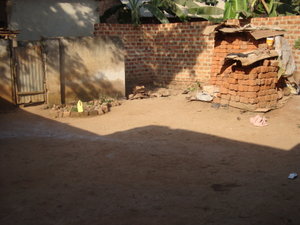Advertisement
Published: January 24th 2011

 The Courtyard
The Courtyard
Outside my house. The pile where they burn all household waste and the toilets and wash area combined (which they seem to do rather too much). We have a separate washrooom in the house.I have been in my family home for nearly 2 weeks. It is amazing how quickly I have felt comfortable in the home, especially as in the first couple of days I feared it could never work out. Even allowing for cultural difference, coming into someone else’s family home is difficult and feels intrusive but we’ve quickly established some boundaries and comfort zones.
My first meeting with my host ‘mum’ was brief, “My name is Hasifa and I’m a Muslim,” She said “Welcome to my home.” My assumption was that I would therefore be living in a Muslim household but that was based on my exposure to culture where religion is a key divide in society. Religion is central to individual identity in Uganda but it does not identify the whole family. When a couple produces children they take on the religion of their father. In my family their father was a Catholic so all the children are Christian but attend different churches according to their preferred denomination.
At the invitation of my host sister, Flavia, Lauren and I attended a ‘born again’ (which I do not quite understand here as they are seemingly ‘born again’ from birth) service on our first Sunday. After a promising start with some great music and a children’s choir, which seemed to have been put together purely for the amusement of their parents (or to keep as blackmail if the fear of sin was not enough in their later life), it descended into tedium. The pastor came onto the stage like something from a Tom Jones concert (only he was tall, black and infinitely better looking), greeted by wild cheering by women at the front. He passed over to a girl who had battled with the devil all her life, the pastor announced the battle over (God was the winner) with the style of a showman. I was not completely taken in by the experience, nor convinced that the ‘donations’ people made were the best use of their very little money, but it was good to see a part of culture that is so central to people’s daily lives.
I later found out that this was not even Flavia’s regular church (as she put it, “they take a long time to pray”) but she went to win votes from the congregation. She is standing as Woman Councillor for LC3 (the Ugandan system of local government, the greater the number the larger the area they cover) at Nansana Town Council. Her brother Bogey/Vincent (Ugandans have an English name and an African one) gave up his job to be campaign manager. They have set up a technical institute for the community where we helped out at one of the computer classes. The other of Mama’s (which is what Hasifa is known as) children is called Monica who works 6 days per week in an IT company in Kampala.
Then we have the additions, Diana and Aisha. Diana is Monica’s daughter but in the absence of her father is looked after by the whole family, particularly her Grandmother. She is about to start school but is still scared of the strange white person and is yet to say a word to. Aisha is an orphan, a child of Mama’s ‘sister’ (which I am yet to work out the meaning of, it could mean she is her niece but more likely is one of her friend’s children). She does nearly all the housework along with Mama but is a rare case, in what I have experienced so far, in that she is an orphan that goes to school.
Advertisement
Tot: 0.083s; Tpl: 0.01s; cc: 9; qc: 40; dbt: 0.0617s; 1; m:domysql w:travelblog (10.17.0.13); sld: 1;
; mem: 1.1mb

 The Courtyard
The Courtyard